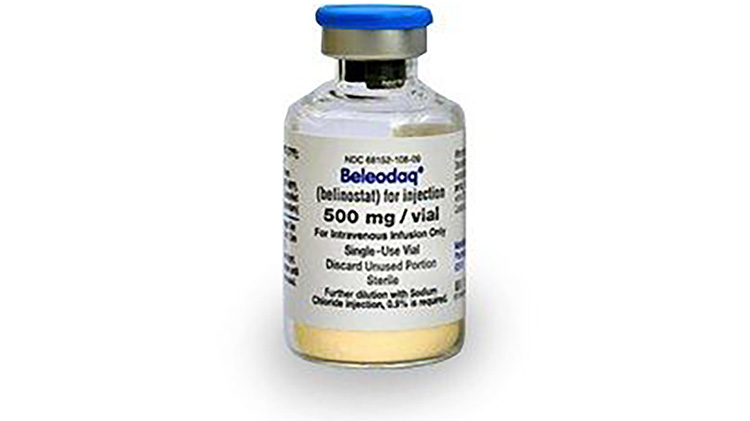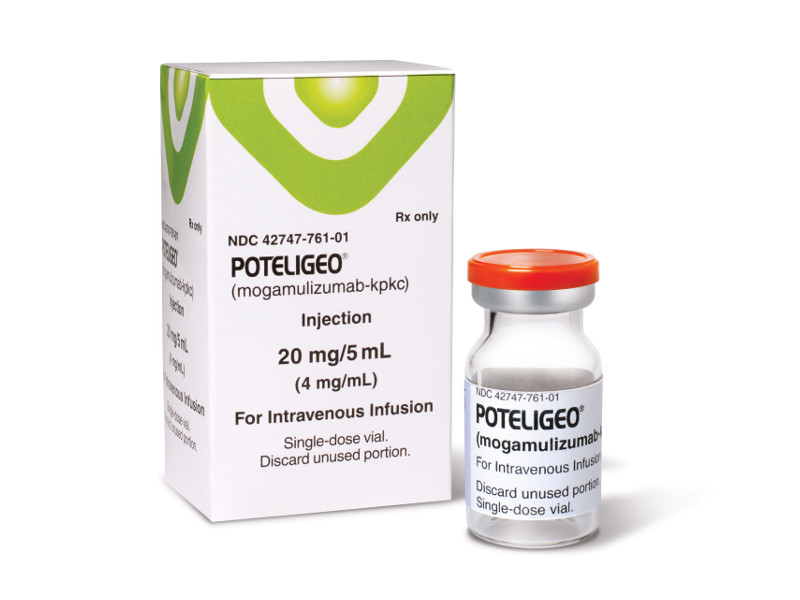Beleodaq (belinostat) vs Poteligeo (mogamulizumab)
Beleodaq (belinostat) vs Poteligeo (mogamulizumab)
Beleodaq (belinostat) is a histone deacetylase inhibitor used for the treatment of patients with relapsed or refractory peripheral T-cell lymphoma (PTCL), a type of non-Hodgkin lymphoma. Poteligeo (mogamulizumab) is a monoclonal antibody that targets the CC chemokine receptor 4 (CCR4) and is indicated for the treatment of adult patients with relapsed or refractory mycosis fungoides (MF) or Sézary syndrome (SS), which are types of cutaneous T-cell lymphoma (CTCL). While both medications are used for different types of T-cell lymphomas and work through different mechanisms, the choice between them would depend on the specific type of lymphoma a patient has, as well as their overall health, prior treatments, and potential side effects.
Difference between Beleodaq and Poteligeo
| Metric | Beleodaq (belinostat) | Poteligeo (mogamulizumab) |
|---|---|---|
| Generic name | Belinostat | Mogamulizumab |
| Indications | Relapsed or refractory peripheral T-cell lymphoma | Relapsed or refractory mycosis fungoides or Sézary syndrome |
| Mechanism of action | HDAC inhibitor | CCR4 antibody |
| Brand names | Beleodaq | Poteligeo |
| Administrative route | Intravenous | Intravenous |
| Side effects | Nausea, vomiting, fatigue, pyrexia, anemia | Drug rash, infusion reactions, fatigue, diarrhea, musculoskeletal pain |
| Contraindications | Known hypersensitivity to belinostat or any of its components | None known |
| Drug class | Antineoplastic agent | Monoclonal antibody |
| Manufacturer | Spectrum Pharmaceuticals | Kyowa Kirin |
Efficacy
Beleodaq (Belinostat) for the Treatment of Lymphoma
Beleodaq, known generically as belinostat, is a histone deacetylase inhibitor approved by the U.S. Food and Drug Administration (FDA) for the treatment of relapsed or refractory peripheral T-cell lymphoma (PTCL). This is a rare type of non-Hodgkin lymphoma that affects the T-cells of the immune system. The efficacy of Beleodaq was evaluated in a multi-center, single-arm, open-label clinical trial, which primarily assessed the overall response rate (ORR). The results demonstrated that Beleodaq can induce partial or complete responses in a subset of patients with PTCL who have failed previous therapies. However, it is important to note that while Beleodaq has shown efficacy in treating PTCL, the response rates may vary, and not all patients will respond to treatment.
Poteligeo (Mogamulizumab) for the Treatment of Lymphoma
Poteligeo, with the generic name mogamulizumab, is a monoclonal antibody that targets the CC chemokine receptor 4 (CCR4) on the surface of some cancer cells. It is FDA-approved for the treatment of adult patients with relapsed or refractory mycosis fungoides (MF) or Sézary syndrome (SS), which are types of cutaneous T-cell lymphomas (CTCL). The efficacy of Poteligeo was established in a pivotal phase III clinical trial known as the MAVORIC study, which compared mogamulizumab to vorinostat in patients with relapsed or refractory MF and SS. The study showed that mogamulizumab significantly improved progression-free survival (PFS) compared to vorinostat, marking a significant advancement in the treatment options for these challenging conditions.
Comparative Efficacy in Lymphoma Treatment
When comparing Beleodaq and Poteligeo in the context of lymphoma treatment, it is essential to understand that they are approved for different subtypes of the disease and their efficacy is not directly comparable. Beleodaq is specifically indicated for PTCL, while Poteligeo is used for MF and SS, subtypes of CTCL. Each medication has demonstrated efficacy in its respective indication through improvement in response rates and, in the case of Poteligeo, progression-free survival. The choice of treatment would depend on the specific type of lymphoma, the patient's previous treatment history, and the overall health status of the patient.
Conclusion
Both Beleodaq and Poteligeo represent important therapeutic options for patients with certain types of lymphoma. Beleodaq offers a treatment possibility for patients with PTCL who have not responded to other therapies, while Poteligeo provides a new avenue for those with relapsed or refractory MF and SS, with demonstrated improvements in PFS. As with all medications, the efficacy of Beleodaq and Poteligeo can vary among individuals, and treatment should be personalized to each patient's unique clinical situation. Ongoing research and clinical trials continue to refine the understanding of how these drugs can best be used in the management of lymphoma.
Regulatory Agency Approvals
Beleodaq
-
Food and Drug Administration (FDA), USA

Poteligeo
-
European Medical Agency (EMA), European Union

-
Food and Drug Administration (FDA), USA

-
Therapeutic Goods Administration (TGA), Australia

Access Beleodaq or Poteligeo today
If Beleodaq or Poteligeo are not approved or available in your country (e.g. due to supply issues), you can access them via Everyone.org.
How it works

Make an enquiry
Choose the medicine you want to buy, answer a couple of questions, and upload your prescription to speed things up. We’ll get back to you within 24 hours.


Make an enquiry
Choose the medicine you want to buy, answer a couple of questions, and upload your prescription to speed things up. We’ll get back to you within 24 hours.


Breeze through the paperwork
We'll guide you through the required documents for importing unapproved medicine, ensuring you have all the necessary information.


Get a personalized quote
We’ll prepare a quote for you, including medicine costs and any shipping, administrative, or import fees that may apply.


Receive your medicine
Accept the quote and we’ll handle the rest - sourcing and safely delivering your medicine.

Some text on this page has been automatically generated. Speak to your physician before you start a new treatment or medication.
Let's talk
If you have any questions, call us or send us a message through WhatsApp or email:
Contact us




